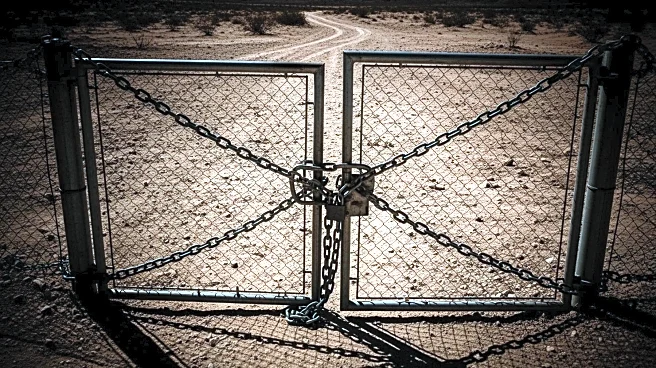What's Happening?
The Rafah border crossing between Gaza and Egypt will remain closed until further notice, according to a statement from Israeli Prime Minister Benjamin Netanyahu's office. This decision follows the Palestinian
embassy in Egypt's announcement that the crossing would reopen for people returning to Gaza. The closure is contingent upon Hamas fulfilling its ceasefire obligation to return the remains of all 28 dead hostages. Currently, Hamas has handed over the remains of 10 hostages and plans to deliver two more. The Rafah crossing, the only one not controlled by Israel before the war, has been closed since May 2024. Its reopening is crucial for Gazans seeking medical treatment, travel, or family visits in Egypt.
Why It's Important?
The closure of the Rafah crossing has significant humanitarian implications for the residents of Gaza, who rely on it as their sole gateway to the outside world. The ongoing conflict and the closure have exacerbated the humanitarian crisis in Gaza, where aid deliveries remain limited. The situation underscores the broader geopolitical tensions in the region, with Israel and Hamas at an impasse over the return of hostages' remains. The closure also affects international diplomatic efforts aimed at stabilizing the region and providing humanitarian relief to the affected populations.
What's Next?
The future of the Rafah crossing and the broader ceasefire agreement depend on the actions of both Israel and Hamas. Israel has indicated that the crossing will remain closed until all hostages' remains are returned. Meanwhile, Hamas has committed to the ceasefire but faces challenges in retrieving remains due to the devastation in Gaza. International mediators may continue to play a role in facilitating negotiations and ensuring the flow of humanitarian aid into Gaza. The situation remains fluid, with potential for further developments as both sides navigate the complex ceasefire terms.
Beyond the Headlines
The ongoing conflict and the closure of the Rafah crossing highlight the deep-seated issues in the Israeli-Palestinian conflict, including the humanitarian impact on civilians and the challenges of achieving lasting peace. The situation raises ethical questions about the treatment of hostages and the responsibilities of warring parties to protect civilian lives. The international community's response and involvement in mediating the conflict could influence future peace efforts and the stability of the region.








